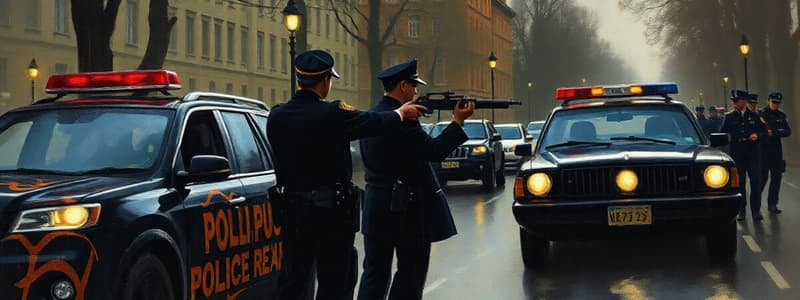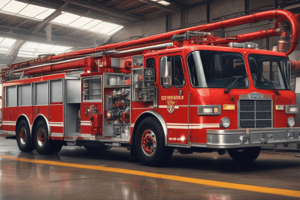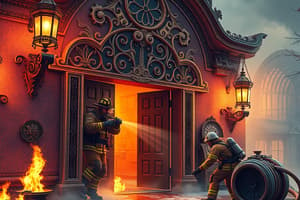Podcast
Questions and Answers
What is the minimum rank required to authorize a roadblock?
What is the minimum rank required to authorize a roadblock?
Which location should be avoided when determining a roadblock site?
Which location should be avoided when determining a roadblock site?
What must be utilized at all times during a roadblock for safety?
What must be utilized at all times during a roadblock for safety?
What type of report is required if officers come into contact with any vehicle during a roadblock?
What type of report is required if officers come into contact with any vehicle during a roadblock?
Signup and view all the answers
What should officers do if they attempt to stop a vehicle using a roadblock but the attempt is unsuccessful?
What should officers do if they attempt to stop a vehicle using a roadblock but the attempt is unsuccessful?
Signup and view all the answers
What is an optional method officers may consider for safely stopping a suspect vehicle in a pursuit situation?
What is an optional method officers may consider for safely stopping a suspect vehicle in a pursuit situation?
Signup and view all the answers
What should be deployed whenever possible during a roadblock to enhance safety?
What should be deployed whenever possible during a roadblock to enhance safety?
Signup and view all the answers
What report is not required unless there is damage to property other than OPD vehicles?
What report is not required unless there is damage to property other than OPD vehicles?
Signup and view all the answers
Which types of vehicles are exempt from being stopped using tire deflation devices without prior approval?
Which types of vehicles are exempt from being stopped using tire deflation devices without prior approval?
Signup and view all the answers
What report must an officer complete if a tire deflation device comes into contact with a vehicle?
What report must an officer complete if a tire deflation device comes into contact with a vehicle?
Signup and view all the answers
Under what condition can a command officer authorize the use of tire deflation devices?
Under what condition can a command officer authorize the use of tire deflation devices?
Signup and view all the answers
What must be done if an officer attempts to use a tire deflation device but it is unsuccessful?
What must be done if an officer attempts to use a tire deflation device but it is unsuccessful?
Signup and view all the answers
In cases of physical cruiser contact, what is referenced for procedures?
In cases of physical cruiser contact, what is referenced for procedures?
Signup and view all the answers
What must occur if the pursued vehicle damages property other than itself during an incident?
What must occur if the pursued vehicle damages property other than itself during an incident?
Signup and view all the answers
Which report is required for non-criminal destruction of property caused by a tire deflation device?
Which report is required for non-criminal destruction of property caused by a tire deflation device?
Signup and view all the answers
Which of the following vehicles is explicitly mentioned as posing an unusual hazard?
Which of the following vehicles is explicitly mentioned as posing an unusual hazard?
Signup and view all the answers
What is the primary requirement for officers before they can use mechanical tire deflation devices?
What is the primary requirement for officers before they can use mechanical tire deflation devices?
Signup and view all the answers
Under what condition should tire deflation devices not be deployed?
Under what condition should tire deflation devices not be deployed?
Signup and view all the answers
How should officers position themselves during the deployment of tire deflation devices?
How should officers position themselves during the deployment of tire deflation devices?
Signup and view all the answers
Which practice is unacceptable when deploying tire deflation devices?
Which practice is unacceptable when deploying tire deflation devices?
Signup and view all the answers
What is the intended function of the police cruiser at a deployment location?
What is the intended function of the police cruiser at a deployment location?
Signup and view all the answers
What should officers consider regarding the traffic in the vicinity during deployment?
What should officers consider regarding the traffic in the vicinity during deployment?
Signup and view all the answers
In what scenario is the use of tire deflation devices justified against two-wheeled vehicles?
In what scenario is the use of tire deflation devices justified against two-wheeled vehicles?
Signup and view all the answers
What is a key consideration for officers selecting a deployment location for tire deflation devices?
What is a key consideration for officers selecting a deployment location for tire deflation devices?
Signup and view all the answers
Under what circumstances are forcible stopping techniques justified?
Under what circumstances are forcible stopping techniques justified?
Signup and view all the answers
What is the primary consideration for officers before employing forcible stopping techniques?
What is the primary consideration for officers before employing forcible stopping techniques?
Signup and view all the answers
Which of the following best defines an 'Exigent Circumstance'?
Which of the following best defines an 'Exigent Circumstance'?
Signup and view all the answers
What is required from officers before conducting a roadblock?
What is required from officers before conducting a roadblock?
Signup and view all the answers
In what manner should roadblocks be established according to the policy?
In what manner should roadblocks be established according to the policy?
Signup and view all the answers
What is the purpose of a Tire Deflation Device as defined in the policy?
What is the purpose of a Tire Deflation Device as defined in the policy?
Signup and view all the answers
What constitutes 'Deadly Force' according to the policy?
What constitutes 'Deadly Force' according to the policy?
Signup and view all the answers
Which of the following is NOT a consideration for officers when deciding to use forcible stopping techniques?
Which of the following is NOT a consideration for officers when deciding to use forcible stopping techniques?
Signup and view all the answers
Study Notes
Police Vehicle Pursuits - Forcible Stopping
-
Preamble: Forcible stopping is justified only in extreme circumstances when a fleeing driver poses a grave danger to officers or the public. Officers must carefully consider the totality of circumstances, including the seriousness of the offense, potential consequences, and officer/suspect/public safety.
-
Policy: The Omaha Police Department (OPD) uses forcible stopping techniques only in the most extreme cases when all other options have been exhausted and officer/citizen safety is at risk.
-
Definitions:
- Deadly Force: Force intended, naturally, and probably resulting in death, or that actually produces death.
- Exigent Circumstance: A life-threatening situation where stopping a fleeing vehicle is necessary to prevent the death or serious bodily injury of officers or the public.
- Overtake: A maneuver to close the distance between the police and target vehicle to initiate a traffic stop, not to apprehend the target.
- Tire Deflation Device: A device used to deflate tires safely to reduce vehicle mobility.
Procedures
-
Roadblocks (Brower v. Inyo County):
- Use with extreme caution, prioritizing the safety of personnel and the public.
- Training Requirements: Officers must complete department-approved roadblock training before conducting a roadblock.
-
Deployment Requirements:
- Roadblocks must allow reasonable opportunity for the driver to stop safely.
- Authorized only by a Lieutenant or higher.
- Clearly marked police vehicles with appropriate officers assigned.
-
Reporting Requirements:
- Officers causing contact/property damage to any vehicle/property during a roadblock must complete a Chief’s Report (OPD Form 214) for Response to Resistance – Use of Force and an Incident Report (OPD Form 189). A motor vehicle accident report is not required unless the roadblock damages property besides the pursued vehicle.
- If a roadblock attempt fails, the officer must report it, noting that the attempt was unsuccessful and no property damage occurred.
Tire Deflation Devices
-
Training Requirements: Officers must complete in-service training prior to using tire deflation devices.
-
Deployment Requirements:
- Upon pursuit, officers certified in the use of tire devices may set up a deployment location in the projected path of the pursuit.
- Immediately advise 911 Dispatch of the location.
- Officers should not overtake or attempt to overtake fleeing vehicles going at high speed to deploy tire deflation devices.
-
Deployment Locations Considerations:
- Obstructions like railroad crossings, sharp turns and curves should be avoided, the visibility of the area must be adequate for officers to observe and react to the pursuit, and other traffic.
- The police cruiser location should not interfere with the path or the violator.
- The cruisers’ lights should be used to prevent other vehicles from driving over the location.
-
Tire Deflation Device Restrictions:
- Not to be thrown from or dropped from moving police vehicles.
- Not to be used in areas that would pose significant risk of injury.
- Locations should have adequate sight of the surrounding area.
-
Tire Deflation Device restrictions: Devices are not to be used on motorcycles or similar vehicles unless deadly force is justified. The devices can't be used on vehicles carrying hazardous materials, passenger buses, vans or vehicles posing a significant danger to innocent bystanders.
Reporting Damage
- Damage caused by a tire deflation device: Officers who deploy a device causing contact or damage to any vehicle/property must complete a Chief’s Report (OPD Form 214) and an Incident Report (OPD Form 189) (for non-criminal destruction of property). A Motor Vehicle Accident report is not required unless the pursued vehicle damages property other than the pursued vehicle.
Physical Cruiser Contact
- See OPD's "Police Vehicle Pursuits" policy for procedures regarding physical cruiser contact during forcible stops.
References
- Court Cases: Brower v. Inyo County, 489 US 593 (1989)
- Nebraska Revised Statutes: NRS §28-109 and §75-364
- Previous OPD Orders: Include specific order numbers and dates.
- Accreditation Standards: CALEA Accreditation standard 41.2.3
- Other Documents: PPM Monthly Updates #1-2020, etc. (list any relevant documents)
Studying That Suits You
Use AI to generate personalized quizzes and flashcards to suit your learning preferences.
Related Documents
Description
This quiz explores the policies and definitions related to forcible stopping in police vehicle pursuits, specifically under extreme circumstances. It covers the justification for using deadly force, the concept of exigent circumstances, and techniques employed by the Omaha Police Department. Test your knowledge of these crucial safety measures and legal considerations.




